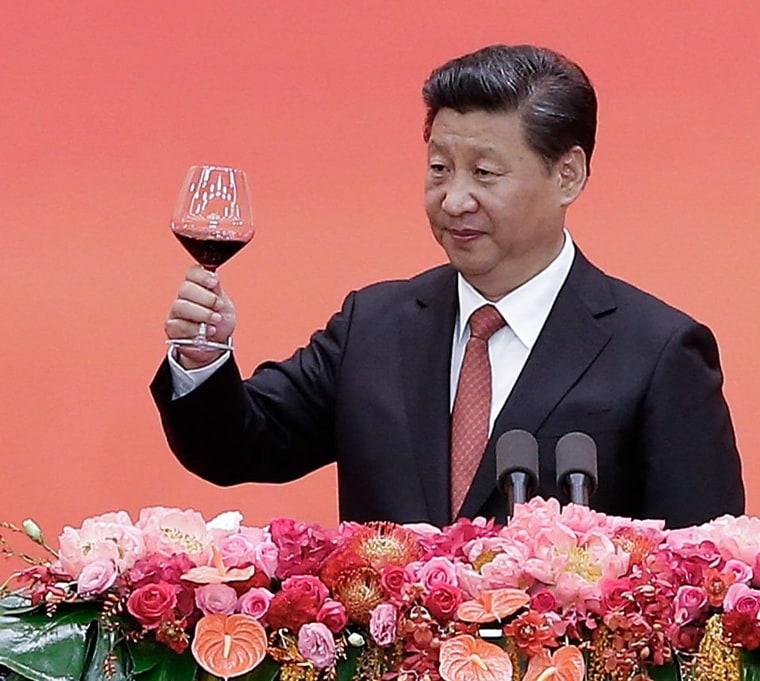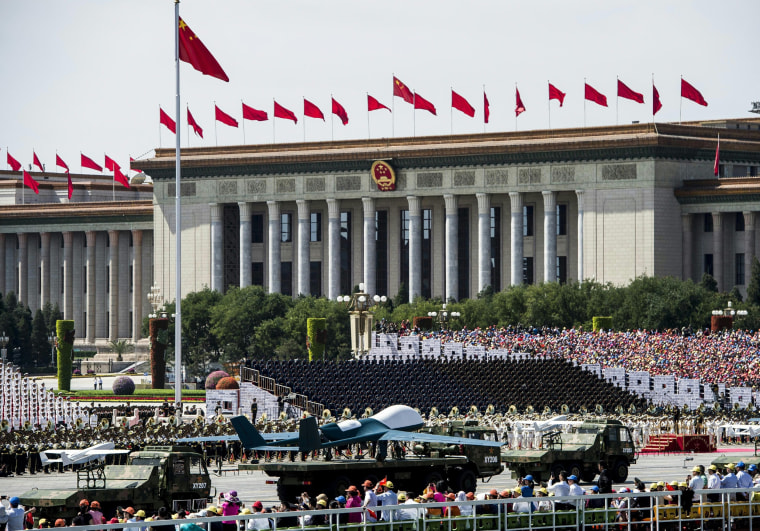BEIJING — It was officially described as a parade to mark Japan's World War II defeat 70 years ago, but Thursday was more than a naked show of force.
For almost an hour, wave after wave of goose-stepping soldiers, tanks and missiles passed through Tiananmen Square, where President Xi Jinping looked on approvingly alongside his guest of honor, Russia's Vladimir Putin. Most Western leaders stayed away.

Beijing had been closed down for the event. Factories were ordered to stop production days ago, cars kicked off the streets to ensure a blue sky backdrop. Offices along the parade route were ordered closed and people living there told to stay away from their windows. Authorities even deployed falcons to scare away birds, and monkeys to hunt for their nests.
This was Xi’s show, designed to portray him and China as strong and confident. But in reality, his credibility is on the line like never before.
The Chinese stock market has been in free fall, creating global shock waves — though it was closed for the parade. The authorities have spent $200 billion in a failed attempt to prop it up, and have threatened those selling shares.
More than 200 people have been detained for what the authorities call "rumor-mongering" in relation to the market. One respected financial journalist, Wang Xiaolu, who works for Caijing Magazine, was arrested and then confessed on state television to causing "panic and disorder.” He was accused of fabricating and spreading false information about the market.
This heavy-handed response — to what appears to be the popping of a massive stock market bubble — has shaken Western analysts in China.
"You can't control a market by arresting people," Anne Stevenson-Yang, research director at J Capital Research, told NBC News.
Related: China to Cut Military by 300,000 Troops
Michael Pettis, professor of finance at Peking University's Guangua School of Management, said: "Credibility is the most important question. The direct impact of the crash is likely to be quite small. The important impact is the effect on credibility."
China is facing the bigger challenge of a rapidly slowing economy that's mired in debt. Until very recently most international analysts were willing to trust the ability of technocrats to engineer what they call a soft landing for the economy and guide it towards a more consumer-driven model, less dependent on investment in factories and ghost towns.
Now these analysts are not so sure, and that marks quite a big in attitude towards China.
Then there is the Tianjin chemical warehouse explosion, where the death toll has now past 160. Company and local government officials have now been detained.
The picture now emerging of the company that owned the warehouse is of a well-connected outfit able to flaunt laws and regulations with impunity. That is not only a blow to government credibility, but also to Xi's high-profile anti-graft campaign, which is facing a fierce backlash within the Communist Party, according to unusually frank reports in state media.
A report last month in the People's Daily, the party's mouthpiece, said his reforms to the economy and drive against corruption had met "immense difficulties."
"There is immense struggle beyond imagination against the reforms,” the story went on to say.
Xi was in his element at the parade Thursday, projecting an image of a man in charge. But the beyond the goose stepping, confidence in him and his technocrats has been fast eroding.

